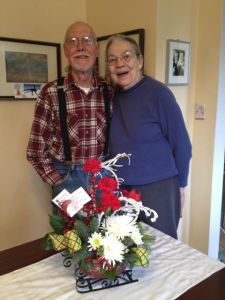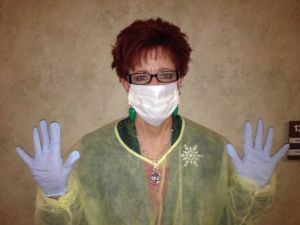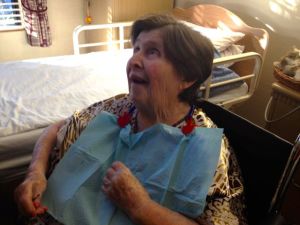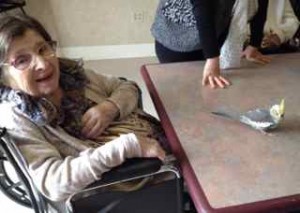
by Diane Masson | Feb 15, 2015

Bill and Amy in 2012
Aging parent’s decisions can drive us crazy or make us sick. When a parent with dementia stubbornly chooses to stay home, it can be heart breaking for the adult children. Watching a senior’s vitality fade is hard enough. But for an adult child to witness a parent’s poor hygiene, lack of nutrition by eating frozen dinners (not fresh food) and to see the absence of good judgment is tough and sad.
Some of us never get sick. Yet here I am, literally worried sick about my in-laws. A month ago my father-in-law, Bill, had a heart attack. My mother-in-law, Amy, with dementia was left alone for the majority of three days and nights as the local children rallied around the dad at the hospital. They did make sure she had food and medications. My husband and I hired a geriatric nurse to evaluate and help Amy. The nurse was to be our eyes and ears, since we live 1000 miles away. By the time the nurse intervened, Amy had become psychotic and had trouble recognizing her own children.
To make a long story short – my father-in-law never wanted to move to a retirement community or assisted living. He actually told my husband and I (working in the senior living business) that he understood that he would be waiting for a health crisis.
Well a crisis is one parent in the hospital and we had two. Over the last month, Bill improved enough to graduate from the hospital, to rehabilitating in skilled nursing care, to living permanently with his adult daughter in her home. He was told by professionals that he could no longer be Amy’s caregiver (he had been her caregiver for five years) and would need help for himself 24-hours a day. Pneumonia and a fall preceded the heart attack and now he has trouble catching his breath if he overexerts himself in any way and can’t remember to take his own medications because of dementia.
Let me fast forward on Amy’s simultaneous crisis. Amy’s Alzheimer’s prevented her from grasping that her husband of 65 years was in the hospital. She eloped (I think she walked away to search for her missing husband and ultimately the police found her) and hit a nurse in her confusion and anxious state. The police took her to the hospital and she resided in the emergency room for two days because they did not have a bed in the locked area. This is the part I don’t even want to imagine because I know they must have had to sedate her completely because she was an elopement risk.
A week later, both the skilled nursing community where Bill was getting rehab and the hospital where Amy resided wanted to discharge them simultaneously. The local children said that was impossible and they had to be discharged one at a time. So Bill was released first. Our goal was to have Amy placed in a quality secured memory care by the end of the next week. That week ended two days ago on Friday. Now it’s a holiday weekend and she is stuck in a locked psych ward in a hospital. Amy could have been discharged on Friday afternoon. The injustice of it all has made me sick. Next week I will share why Amy was not released – you will be shocked and disgusted.
Diane Masson’s new guide book for seniors, “Your Senior Housing Options,” will be will be coming soon to Amazon.com. If you sign up for my weekly newsletter on the right side of this blog, you will be notified when my new book becomes available. Check out my new website: Tips2Seniors.com or please follow me on Facebook.
Diane Twohy Masson is the author of “Senior Housing Marketing – How to Increase Your Occupancy and Stay Full,” available at Amazon.com with a 5-star rating. The book is required reading at George Mason University as a part of its marketing curriculum. Within this book, the author developed a sales & marketing method with 12 keys to help senior living providers increase their occupancy. Masson developed this expertise as a marketing consultant, sought-after blogger for senior housing and a regional marketing director of continuing care retirement communities in several markets. She has also been a corporate director of sales and a mystery shopper for independent living, assisted living, memory care and skilled care nursing communities in multiple states. Currently, Masson is setting move-in records as the regional marketing director of two debt-free Continuing Care Retirement Communities in Southern California – Freedom Village in Lake Forest and The Village in Hemet, California. Interestingly, this career started when she was looking for a place for her own mom and helped her loved one transition through three levels of care.
© Marketing 2 Seniors| Diane Twohy Masson 2015 All Rights Reserved. No part of this blog post may be reproduced, copied, modified or adapted, without the prior written consent of the author, unless otherwise indicated for stand-alone materials. You may share this website and or it’s content by any of the following means: 1. Using any of the share icons at the bottom of each page. 2. Providing a back-link or the URL of the content you wish to disseminate. 3. You may quote extracts from the website with attribution to Diane Masson CASP and link https://www.marketing2seniors.net For any other mode of sharing, please contact the author Diane Masson.

by Diane Masson | Dec 28, 2014
 What a sad circumstance for seniors to be alone during the holidays. Is the isolation voluntary or involuntary? My poor mom has ecoli and was put into isolation at her skilled nursing community. Everyone has to wear a gown, gloves and a mask to enter her room. She will NOT get to dine with her fellow residents for four more days. Fortunately, she is more than halfway through her antibiotic and feels good now. She was in great spirits today and even invited me to stay for lunch!
What a sad circumstance for seniors to be alone during the holidays. Is the isolation voluntary or involuntary? My poor mom has ecoli and was put into isolation at her skilled nursing community. Everyone has to wear a gown, gloves and a mask to enter her room. She will NOT get to dine with her fellow residents for four more days. Fortunately, she is more than halfway through her antibiotic and feels good now. She was in great spirits today and even invited me to stay for lunch!
Some seniors become isolated as they age in their home like my in-laws. They refuse to move to a retirement community. Both have dementia and neither of them drives. They are 100 percent dependent on one local son to bring them groceries, take them to the doctor and socialize with them. Is this enough human interaction? I don’t think so.
Other seniors determined to stay at home, use home care and become dependent on a single caregiver. Is this a healthy life? The rest of us interact with 10 or 20 people a day. What happens when someone only interacts with one person, day after day, month after month? Many years ago, my mom was in this situation and it was when the memory issues began.
Every senior faces a choice to plan ahead by moving to a senior living community or wait until a health care crisis and live with the consequences. I hope and pray that more seniors chose multiple human interactions by moving to a senior living community. My mom started to thrive again after she moved to assisted living. My in-laws could thrive again too, but they refuse.
My mom is in a good place and will see quite a few different staff during her isolation. My in-laws are 1000 miles away and will be in a lonely house for the holidays. The house can’t talk to them, smile at them or buy them groceries.
Diane Masson’s new guide book for seniors, “Your Senior Housing Options,” will be will be coming soon to Amazon.com. If you sign up for my weekly newsletter on the right side of this blog, you will be notified when my new book becomes available. Check out my new website: Tips2Seniors.com or please follow me on Facebook.
“Your Senior Housing Options,” is dedicated to my mother, whose stories are peppered throughout. Being her advocate for over ten years has taught me to be a better person. My mom has dementia, but I am truly blessed that she still calls me by name. Her smile and joy inspires me to see the positive side of life. It makes me want to reach out and help seniors and their families make better choices today so they can have more secure long-term care plans tomorrow.

by Diane Masson | Dec 21, 2014

My Mom’s Christmas Throw Blanket
When I brought my mom a Christmas gift from my brother and sister-in-law, she had no recognition on her face as she read the tag. My mom’s vascular dementia is stopping her from connecting her son’s written name with his face. That part of her brain is gone. So what do you do?
Does your mom or dad have dementia? Are they still at home or residing in an assisted living, memory care or skilled nursing community? My mom has had dementia for 12 years and has lived in skilled nursing care for 19 months. She cannot remember anything and only speaks clearly about 30 to 50 percent of the time.
My recommendation is to give a photo of yourself with your gift. Attach your photo directly to the gift. Your parent has a better chance of recognizing you in the photo than knowing who you are by reading a gift tag.
Here are 10 dementia gift ideas:
- A soft lap blanket – I gave my mom a small Christmas blanket and it was a homerun. Every time she sees it, she touches it and comments on the softness. My intention was giving a functional gift (keeping her warm) and an easy way for her to recognize the holiday season. It has really worked, because last night she talked about Christmas on her own.
- A manicure or hand massage – Hopefully this can be performed by you? It is a way to connect physically, so they can feel your presence and love. My mom loves having her nails done.
- A sweater – A nice red sweater or sweatshirt is always a hit. They like to feel the texture of different clothes. It keeps them warm. Their caregiver will dress them in the sweater and then keep reminding them that it is Christmas time. The red color seems to help the mood of the caregiver, which is always a bonus.
- Soft socks – If your mom or dad has swollen ankles, normal socks can feel binding. I get those soft stretchy socks you find in airports. They used to be easy for her to put on herself. Now she needs a caregiver to dress her.
- A holiday balloon – My mom used to read the paper daily to know the day and the year. Now, I put up seasonal balloons in her room, so she can know it is her birthday, Thanksgiving, Christmas, etc.
- A small fake tree with ornaments – If your parent still lives at home, maybe you can decorate for them? If they live in assisted living, memory care or skilled nursing care a tree always feels like home. Many communities cannot legally allow a real tree because of licensing, so be sure to ask.
- A ham – If your parent still lives at home, this is an awesome gift. They can heat the ham or eat it cold. They can make numerous meals out of it including sandwiches or with scrambled eggs. Yum!
- Bring lunch to them or go out to eat – Everyone gets sick of their own cooking or the community’s cooking. Something different and special is always a hit. The best part is spending time dining with you.
- An animated animal – If your parent still lives at home with a pet, then bring a gift for Fido or Fluffy. But if your parent lives in an assisted living, skilled nursing or memory care community a fake moving pet is outstanding. My mom has several fake cats and they completely enamor her, make her smile and laugh out loud. Pets are wonderful.
- The very best gift you can give is an hour of your time. Nothing is more important than spending a little quality time together.
Gift giving needs to be adjusted to the level of care and to the severity of your parent’s dementia. Good luck and share your other gift tips in the comment section.
Diane Masson’s new guide book for seniors, “Your Senior Housing Options,” will be will be coming soon to Amazon.com. If you sign up for my weekly newsletter on the right side of this blog, you will be notified when my new book becomes available. Check out my new website: Tips2Seniors.com or please follow me on Facebook.
“Your Senior Housing Options,” is dedicated to my mother, whose stories are peppered throughout. Being her advocate for over ten years has taught me to be a better person. My mom has dementia, but I am truly blessed that she still calls me by name. Her smile and joy inspires me to see the positive side of life. It makes me want to reach out and help seniors and their families make better choices today so they can have more secure long-term care plans tomorrow.

by Diane Masson | Nov 2, 2014
 Am I a bad daughter? Yesterday, I learned the shocking truth that my mom has five missing teeth. My mom has lived in a higher level of care for over eight years. Seven years in assisted living in Seattle and the last 17 months in skilled nursing care in California.
Am I a bad daughter? Yesterday, I learned the shocking truth that my mom has five missing teeth. My mom has lived in a higher level of care for over eight years. Seven years in assisted living in Seattle and the last 17 months in skilled nursing care in California.
My mother has had vascular dementia for over 10 years and I have been attending doctor appointments with her for years. Why did I never consider oral health and attending a dentist appointment?
It was pure luck that I visited my mom this week when the mobile dentist was there. Dr. Mark Mroch was awesome. He had a funny and engaging personality. My mom was completely enamored with him. They were joking back and I forth and I was cracking up.
According to dental records the five teeth were missing when my mom arrived in California. Now that I have processed this situation, I have some unanswered dental questions:
- Why did no one tell the POA (Power of Attorney) of a dementia patient that her mom had five teeth missing when it was first discovered?
- Has my mom with her dementia been responsible for her own dental hygiene for all these years?
- Do assisted living and skilled nursing communities brush and floss teeth?
- How often?
- If the senior tells the caregiver that flossing hurts, do they just discontinue flossing and not tell the family?
- Is a dentist required to request flossing in order for it to happen?
Can you please share what the oral hygiene policy is at your assisted living, skilled nursing or memory care community? I know the goal is to have the residents be as independent as possible and brush his or her own teeth. What if they are not doing a good job? When does staff step in to help? Do staff actually watch them brush their teeth or is this one of those back burner items that can get overlooked?
My mom lived in a social model of assisted living. She was borderline skilled nursing for a year or so before we moved her. Is the dental program for dementia different in a social vs. medical model of assisted living?
Please help me figure this out and maybe we can help some POA’s out there who never thought about oral hygiene before. It’s vital that we advocate for our loved one.
Thanks, Diane
Diane Twohy Masson writes this weekly blog to support and engage with other senior housing professionals. Her first book is Senior Housing Marketing – How To Increase Your Occupancy and Stay Full. Many sales teams and organizations have used the 12 keys contained in this book for their weekly book review.
Diane Masson has recently created a New Guide for the Silver Tsunami. Her second book offers a pro-active approach for a senior to navigate his or her way through the senior housing market. “Selecting Senior Housing Options for Seniors IN the Silver Tsunami” is coming soon to Amazon.com. www.tips2seniors.com
© Marketing 2 Seniors| Diane Twohy Masson 2014 All Rights Reserved. No part of this blog post may be reproduced, copied, modified or adapted, without the prior written consent of the author, unless otherwise indicated for stand-alone materials. You may share this website and or it’s content by any of the following means: 1. Using any of the share icons at the bottom of each page. 2. Providing a back-link or the URL of the content you wish to disseminate. 3. You may quote extracts from the website with attribution to Diane Masson CASP and link https://www.marketing2seniors.net For any other mode of sharing, please contact the author Diane Masson.

by Diane Masson | Jun 1, 2014
 Yesterday, I learned of a senior resident in California who was denied HER long-term care coverage in skilled nursing, because she had missed one payment while ill. Are you seriously kidding me? This is flat out wrong and it makes me angry. I have been in the senior living industry for fifteen years and always considered those with long-term insurance fortunate.
Yesterday, I learned of a senior resident in California who was denied HER long-term care coverage in skilled nursing, because she had missed one payment while ill. Are you seriously kidding me? This is flat out wrong and it makes me angry. I have been in the senior living industry for fifteen years and always considered those with long-term insurance fortunate.
Now I realize that when a senior is most vulnerable is also when they need this coverage to kick in. Who will fill out the paperwork? All the Continuing Care Retirement Communities where I work graciously accommodate residents in this area. But what about missing a payment to the long term care insurance company? This seems bound to happen.
According the Alzheimer’s Association one in three seniors die of dementia, so it would make sense that a senior with dementia or Alzheimer’s might miss a bill or two. So all those years of paying in for a higher level of care are negated when you are sick and demented? Come on, this is not acceptable.
Long-term care insurance is a security blanket to offset the high cost of future health care as you age. Many seniors have paid in for years to either have a policy that provides up to a certain dollar amount or certain time range (typically three years).
The senior and her family are all panicked. The son made numerous attempts to call his mom’s insurance company and would remain on hold for over forty minutes. Unbelievably, after he finally reached them thirty days later, the policy had expired two days before for lack of payment. If someone has been paying for long-term care insurance for years, you should not be penalized when you are sick and need the care the most. The family is appealing.
Has anyone else heard of this happening? Is this normal? Do you think it is okay?
Please consider joining this exclusive Marketing2Seniors blog and comment below to join the conversation and interact with other senior living professionals on what is currently being effective to increase occupancy on a nationwide basis.
Diane Twohy Masson is currently writing a new book for seniors on how to select senior housing options. Her first book, “Senior Housing Marketing – How to Increase Your Occupancy and Stay Full,” is available at Amazon.com with a five star rating. Masson continues to set move in records as the regional marketing director of two debt-free Continuing Care Retirement Communities in Southern California – Freedom Village in Lake Forest and The Village in Hemet, California. Her mom’s struggle with dementia is inspiring Diane to pen a third book to support adult children.
© Marketing 2 Seniors| Diane Twohy Masson 2014 All Rights Reserved. No part of this blog post may be reproduced, copied, modified or adapted, without the prior written consent of the author, unless otherwise indicated for stand-alone materials. You may share this website and or it’s content by any of the following means: 1. Using any of the share icons at the bottom of each page. 2. Providing a back-link or the URL of the content you wish to disseminate. 3. You may quote extracts from the website with attribution to Diane Masson CASP and link https://www.marketing2seniors.net For any other mode of sharing, please contact the author Diane Masson.

by Diane Masson | Mar 9, 2014

My Mom With Bird
My mom is 91 years old and has vascular dementia. She has slowly declined over the last nine years. Through my research, I can assume she is in one of the last two stages of dementia (there are seven). My mom has been in skilled nursing care for the last 9½ months and needs 100% assistance. The last thing that she could do on her own was feed herself.
Now she has dramatically declined in the last month and even needs assistance with eating. She is still a good eater, but does not have the cognition to eat on her own. It is too much work for her. Her short-term memory seems like it has decreased to about one-second.
Antipsychotic medications have reduced the amount and the intensity of her delusions, anxiety, crying and irritability. There have been medications added, increased and decreased in the last four months. It has been a balancing act to try to improve the quality of her emotions and cognition without having her become lethargic.
Now my mom’s memory loss has affected her ability to walk. At the last care conference meeting, we discussed the quality of her life and whether it is a good idea to try to make someone walk or not. It takes constant encouragement to get her walking and she keeps trying to sit down. I have advocated for the caregivers to keep trying to walk her daily. They never make her, but lots of encouragement can produce a walk to breakfast or lunch. By dinnertime, my mom’s Sundowners Syndrome with anxiety and crying make it impossible to walk her.
My mother seems confused and miserable when she walks and just wants to sit down. I want to try to decide in the next week, if I should just let advocacy regarding walking stop all together. In my opinion walking seems so important because it gets her circulation going and her memory seems to clear up. When the walking officially stops, the memory will for sure get worse. Maybe I just need to accept my mom is in the final stage of dementia and have her enjoy what she can…like playing with the new bird at the community.
Please share your successes, failures or comment below to join the conversation and interact with other senior living professionals on what is currently being effective to increase occupancy on a nationwide basis.
Diane Twohy Masson is the author of “Senior Housing Marketing – How to Increase Your Occupancy and Stay Full,” available at Amazon.com with a 5-star rating. The book is required reading at George Mason University as a part of its marketing curriculum. Within this book, the author developed a sales & marketing method with 12 keys to help senior living providers increase their occupancy. Masson developed this expertise as a marketing consultant, sought-after blogger for senior housing and a regional marketing director of continuing care retirement communities in several markets. She has also been a corporate director of sales and a mystery shopper for independent living, assisted living, memory care and skilled care nursing communities in multiple states. Currently, Masson is setting move-in records as the regional marketing director of two debt-free Continuing Care Retirement Communities in Southern California – Freedom Village in Lake Forest and The Village in Hemet, California. Interestingly, this career started when she was looking for a place for her own mom and helped her loved one transition through three levels of care.
© Marketing 2 Seniors| Diane Twohy Masson 2013 All Rights Reserved. No part of this blog post may be reproduced, copied, modified or adapted, without the prior written consent of the author, unless otherwise indicated for stand-alone materials. You may share this website and or it’s content by any of the following means: 1. Using any of the share icons at the bottom of each page. 2. Providing a back-link or the URL of the content you wish to disseminate. 3. You may quote extracts from the website with attribution to Diane Masson CASP and link https://www.marketing2seniors.net For any other mode of sharing, please contact the author Diane Masson.






